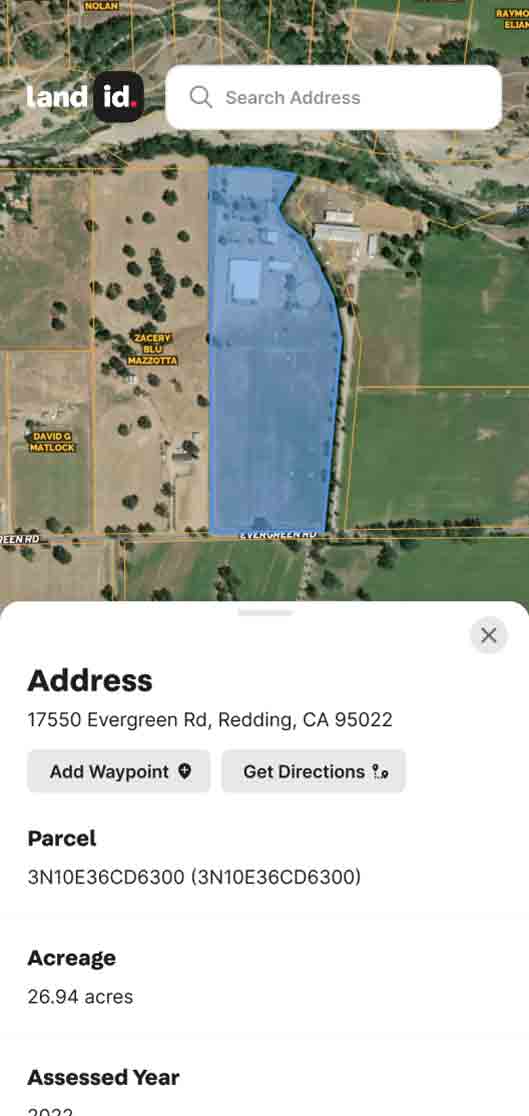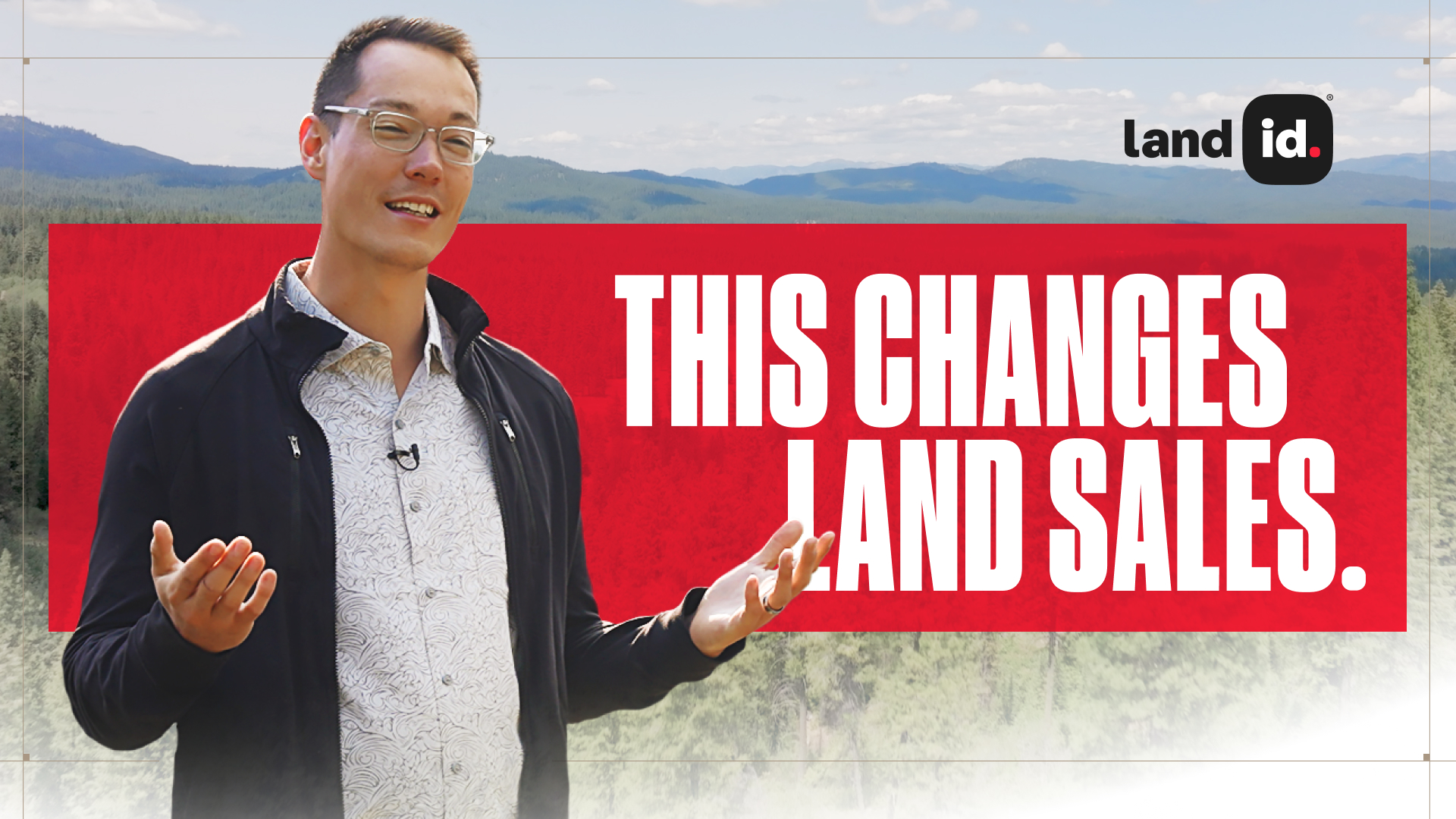Thinking about selling a piece of vacant land? Maybe you're getting great offers from land buying companies, or perhaps you're a realtor selling land in a growing market. Whatever your reason, there's a strategic approach to getting the most out of your land sale.
This guide will equip you with key strategies to maximize your land's value before you hit the market, allowing you to sell the land fast and without any hassle.
Main Takeaways From This Article:
- Understanding your land's potential is crucial for maximizing its value.
- Zoning changes and regulatory approvals can significantly enhance your land's appeal.
- Strategic improvements, such as infrastructure upgrades and landscaping, boost attractiveness and market readiness.
- A detailed, custom map can effectively showcase your property's features to prospective land buyers.
- Leverage tools like Land id® to create enriching overlays and custom maps that transform and streamline your land sales approach.
Why Would You Sell Land?
There are many reasons someone might decide to sell their land, and it often depends on their life circumstances and goals. Here are some common reasons:
- Life Changes: This could be anything from downsizing after children leave home to a career change that necessitates relocation.
- Financial Considerations: Selling vacant land can be a way to access capital you need for other things. You might want to invest in a new business venture, pay off debt, or simply free up some cash.
- Unlocking Development Potential: If your land is zoned for higher-value uses than its current state, selling could be a way to capitalize on that potential.
- Inheritance or Estate Planning: Land inherited from family members might not fit your needs or long-term goals. Selling it can simplify your life and provide financial security.
- Retirement Planning: Selling land can free up capital for a comfortable retirement or allow you to relocate to a more desirable location.
- Relocation: If you're moving to a new area, selling your existing land might be necessary.
- Dealing with Unwanted Land: Sometimes, land becomes a burden. Perhaps you inherited property in a remote location you have no use for, or the ongoing costs of maintaining it outweigh any benefits.
Factors Influencing Land Value

Understanding the key factors that shape your land's market value plays a crucial role in maximizing your return. Here are some of these key factors:
Location and Accessibility
This is a big one! Proximity to urban centers, stunning scenery, and easy access to major roads and transportation routes all significantly increase a property's value. Think about it: would you pay more for a secluded plot far from amenities or a piece of land with convenient access to everything you need?
Zoning and Regulatory Impact
Not all land is created equal in the eyes of the law. Zoning regulations dictate what types of development are allowed on your property. Land zoned for commercial use will naturally command a higher price than land restricted to agricultural purposes. Knowing the zoning specifics of your land sets buyer expectations and directly impacts the market price.
Supply and Demand Trends
Land value is also influenced by market forces. You can expect a higher purchase price if there's a high demand for land suited to the uses allowed on your property. Researching current market trends in your area will help you price your land competitively.
Environmental and Physical Characteristics
What kind of land are you selling? Buyers are interested in:
- The soil quality
- Natural resources present (like timber or minerals)
- Any potential drawbacks like wetlands or floodplains
Land with fertile soil ideal for agriculture will naturally be more valuable than a rocky, barren plot. Understanding your land's unique environmental and physical characteristics will help you position it effectively for the right buyer.
Understanding Your Land's Value
Armed with the knowledge of the key factors influencing land value, you're now ready to get personal and assess the worth of your own property. This involves a two-pronged approach:
- Understanding its current value
- Leveraging strategies to further enhance this value
An appraisal provides a valuable, unbiased assessment and strengthens your negotiation position when potential buyers come knocking. Consider getting a professional appraisal from a qualified land appraiser. They will visit your property, analyze the above mentioned factors, and compare it to similar properties recently sold in your area. This will provide you with a reliable estimate of your land's fair market value based on current market conditions and your property's unique features.
If you're in favor of the DIY approach, you can conduct a comparative market analysis (CMA). This involves researching recent sales of similar properties in your area and using that information to estimate the value of your own land. While not as precise as a professional appraisal, a CMA can give you a ballpark figure to work with.
Strategies To Enhance Land Value

Now that you understand the key factors influencing land value and have a good grasp of your property's strengths and weaknesses, let's explore some proven strategies that can elevate its appeal and potentially boost its selling price, making it even more attractive to potential buyers:
1. Upgrade Infrastructure and Utilities
Easy access to electricity, water, and essential utilities like sewage systems makes your land significantly more attractive to buyers. If these utilities are not already available, consider the feasibility of adding them.
2. Secure Rezoning Approvals
If your land is currently zoned for uses that don't reflect its full potential, consider exploring rezoning options. This process can take time and effort, but if successful, it can dramatically increase your land's value. For instance, land zoned for agriculture might be ideal for residential development, and rezoning could unlock that potential.
3. Enhance Landscaping and Aesthetics
First impressions matter! Clearing brush, mowing overgrown areas, planting trees or creating walking paths can significantly improve your land's curb appeal. Highlighting natural features like a babbling brook or a scenic vista can make your property even more desirable.
4. Develop Access Roads
Providing easy access to your land is essential, especially for larger properties. Consider the cost-effectiveness of building access roads or improving existing ones to make your land more easily navigable for potential buyers.
5. Clear Debris and Improve Land Condition
Buyers are more likely to envision their dream project on a clean and well-maintained piece of land. Remove any trash or debris that surrounds the property, and address any eyesores that might detract from the land's overall appeal.
6. Market Aggressively to Target Audiences
Don't just rely on a "For Sale" sign. Develop a targeted marketing plan that reaches the right audience. Are you selling land ideal for developers, farmers, or nature enthusiasts? Tailor your message and marketing channels to attract the most qualified buyers.
7. Create and Showcase Detailed Property Maps
Creating detailed property maps helps buyers see your land's layout and features clearly. Tools like Land id® let you add useful overlays for utilities, terrain, and access points. Good maps highlight what makes your land special, making it more appealing and ready for the market. This can lead to more interest and better offers.
How Does Selling Land Work?

Selling land involves more than just sticking a sign in the yard and waiting for offers. There's a process involved, and understanding the key steps will ensure a smooth and successful transaction.
Here's what you can expect:
- Understanding Buyer Needs: Successful land sales hinge on anticipating and addressing potential buyer concerns. Knowing what information they typically seek allows you to be prepared and showcase your land's value proposition. We'll explore this in more detail in the next section.
- Preparation Is Key: Just like any major undertaking, selling land requires preparation. This might involve getting a professional appraisal, enhancing your land's value, as discussed previously, and finalizing your asking price.
- Marketing and Showcasing: A targeted marketing strategy is crucial for reaching the right audience. Additionally, showcasing your land through open houses, virtual tours, and compelling property maps (like those offered by Land id®) can generate significant interest.
- Negotiation and Closing the Deal: Be prepared to negotiate offers and counteroffers to reach a mutually beneficial agreement. Once terms are agreed upon, the legal aspects come into play, ensuring a smooth closing process.
Key Information Buyers Seek
For a real estate agent, selling land involves more than just applying effective marketing techniques and connecting with the right audience. It requires a deep understanding of the land and potential buyers' specific needs and interests. To prepare for inquiries, consider the following areas for research:
Land Potential
Buyers typically have specific plans for the land, such as building a home, farming, ranching, or recreational uses. Be equipped with pertinent information by conducting an appraisal to assess physical conditions like soil type, as well as legal constraints like zoning. Also, analyze the financial implications of possible projects and how the land's features could be optimally utilized.
Zoning Regulations
Buyers may have diverse intentions, such as constructing a guest house, raising chickens, or starting a home-based business. It is your responsibility to provide accurate zoning information. This can often be found online, including details about floodplains or wetlands, or by contacting your local department of licenses and inspections.
Buildability
The feasibility of constructing on the land is a critical consideration for many buyers. Ensure you can provide information on any land regulations and restrictions by consulting local building authorities, conducting a title search, and possibly employing a surveyor to evaluate the property.
Accessibility
Questions about access are common. Consider whether there is a private entrance, whether seasonal weather could impede access, or if there are any water crossings that could be hazardous during floods. Previous owners can be excellent resources for this type of information.
Utility Access
Utilities are a crucial factor for most land purchases. Don’t assume utility readiness merely based on visible infrastructure like power lines. Verify the presence and condition of septic systems, water sources, and the feasibility of installing underground power lines. Additionally, consider internet connectivity, particularly in rural areas where remote work might require a reliable, high-speed connection.
Step-by-Step Guide To Selling Land: From Preparation to Closing

Now that you understand the factors influencing land value, strategies to enhance it, and the overall selling process, let's explore a more detailed process to ensure a smooth and successful land sale.
1. Evaluate Market Trends
Knowledge is power! Research current market trends in your area. What types of land are in high demand? What's the average selling price for similar properties? Understanding market conditions will help you set a competitive asking price and attract potential buyers.
2. Prepare and Enhance the Land
Remember those value-enhancing strategies we discussed earlier? Now's the time to put them into action! Consider getting an appraisal (if you haven't already), improve accessibility, clear debris, and showcase the natural beauty of your land. Every bit counts towards making a good first impression.
3. Set an Optimal Asking Price
Strike a balance between maximizing your return and attracting buyers. Consider the appraisal value (if available), market research, and the unique features of your land. Consulting with real estate agents experienced in land sales can also be helpful in determining a fair and competitive asking price.
4. Develop a Targeted Marketing Plan
Develop a marketing plan that reaches the right audience for your property type. Utilize online listing platforms, create eye-catching interactive maps with Land id®, and consider signage on or near the property if appropriate. For larger properties, open houses can be a great way to showcase the land in person, once you’ve captured their interest with your digital showcase.
5. Showcase the Property to Prospective Buyers
Be prepared to answer questions and highlight the strengths of your land. Potential buyers will be interested in zoning regulations, access points, utility availability, and environmental considerations. Having clear and informative property maps (like those created with Land id®) can be a game-changer when it comes to showcasing your land quickly and effectively.
6. Negotiate Offers Effectively
Buyers may submit offers, and negotiation is often part of the process. Be prepared to counteroffer and reach a mutually beneficial agreement. Having a clear understanding of your land's value and market trends will strengthen your negotiating position.
7. Complete Legal Checks and Documentation
To sell vacant land or the land you may be occupying now, you will need to sort through the legal paperwork and observe due diligence. Therefore, it's wise to consult with a real estate attorney to ensure all contracts, deeds, and disclosures are completed accurately and in accordance with local regulations.
8. Close the Transaction
Once all contingencies are met, legalities are ironed out, and paperwork is finalized, it's time for closing. This is where ownership of the land is officially transferred to the buyer. Be prepared to sign documents and finalize the sale.
Transform Your Land Sales With Land id®
Equipped with this knowledge, you're well on your way to successfully selling your land and maximizing your return. Remember, the key lies in understanding your land's value, implementing strategies to enhance its appeal, and confidently navigating the selling process.
But there’s one tool that can truly transform your land sales efforts: Land id®.
Land id® consolidates all details about a parcel of land into a single, interactive map, providing a clearer and more concise method for conveying key property attributes and offering viewers an intuitive way to explore the land. Utilize our robust platform to create maps that do more than just show real estate locations but help viewers truly understand every aspect of a property.
Ready to experience the Land id® difference? Sign up for a free 7-day trial today and discover how our powerful mapping tools can revolutionize your land sales approach.
FAQs
Continue Reading





